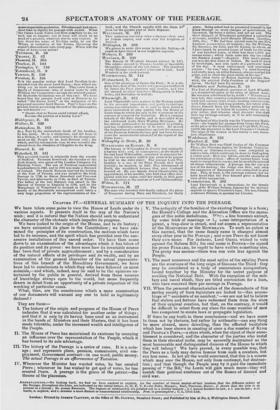CHAPTER IV.—GENERAL SUMMARY OF THE INQUIRY INTO THE PEERAGE.
We have taken some pains to view the House of Lords under its various aspects. It presents itself in the way of the Nation's wish ; and it is natural that the Nation should seek to understand the character of the obstacle which impedes its progress. We have looked to the origin of the House, and to its history ; we have estimated its place in the Constitution ; we have exa- mined the principles of its construction, the motives which have led to its increase, and the spirit which has presided over the suc- cessive installations of this sacred order. We have then come down to an examination of the advantages which it has taken of its position and its power: we have seen how its invariable course has been that of private aggrandizement ; and by a consideration of the natural effects of its privileges and its wealth, and by an examination of the: general character of the actual representa- tives of this branch of the Hereditary Government, we have been led to conclusions in which they who have followed us must coincide,—and which, indeed, may be said to be the opinions en- tertained by the public in general, derived from those sources of knowledge always open to the world, but more frequently drawn in detail from an opportunity of a private inspection of the working of particular cases.
What, then, are the conclusions which a mere examination of our documents will warrant any one to hold as legitimately deduced e
They are these—
I. The history of the origin and progress of the House of Peers indicates that it was calculated for another order of things ; and that it is only by its having been used as an instrument in the hands of Ministers and their Masters, that it has been made tolerable, under the increased wealth and intelligence of the People.
II. The House of Peers has maintained its existence by usurping an influence over the representation of the People, which it has turned to its sole advantage.
HI. The history of the Peerage is a series of sons. It is a coin- age ; and represents place, pension, commission, civil em- ployment, Government contract—in one word, public money. The actual Peerage is an efflorescence of Taxation.
IV, Whenever the Minister has wanted votes, he has created Peers ; whenever he has wished to get quit of votes, he has created Peers. A peerage is the grave of the patriot—the throne of the placeman. V. The antiquity of the families Of the existing Peerage is a farce; the Herald's College and the Alienation Office are the mana- gers of this noble melodrama. Vtil-ic:-1 a line becomes extinct, by some trick of marriage or by some interpretation of a patent, a trap-door is struck, and out comes a representative of the MORTIMERS or the MOWBRAYS. To such an extent is this carried, that the same family name is changed almost every other year in the Peerage ; and some Peers do not know their own name. For instance, Lord ORIEL wished to vote against the Reform Bill; his real name is FOSTER—he signed his proxy FERRARD, he ought to have written sothething else. The proxy was useless—there was one vote less against the People.
VI. The most numerous and the most active of the existing Peers are the creations of the tong reign of GEORGE the Third : they may be considered as a Cody of unconscious conspirators, bound together by the Minister for the sedret purpose of swelling the National Debt. With the exception of the mili- tary and naval -chiefs, they are titled contractors for a loan, who have received their per centage in Peerage.
VII. When the personal characteristics of the descendants of this motley society of born legislators are looked to—this assem- blage of " accidents of an accident,"—we are not led to believe that station and fortune have redeemed them from the stain of their original creation, but that, on the contrary, it would be difficult to select from any class the same number of men less competent to create laws or propagate legislation.
If there he any truth in these conclusions—and We have come to them not by rhetoric, but rather by arithmetic—can any thing be more absurd, more drivelling, than the affected hesitation which has been shown in creating at once a due number of KING and PEOPLE'S Peers,—a class which, when the object of their enno- blement is considered, and the character of the parties who instal them in their elevated niche, may be assuredly maintained as the most honourable and distinguished division of the House to which they will belong? We have proved, in every possible way, that
the Peers as a body may derive honour from such a creation, but can lose none. Is not all the world convinced, that this is a course
which may save the House, not only from contempt, but destruc- tion; and that though the People may by it gain the immediate passing of "the Bill," the Lords will gain much more—they will snatch- their political existence out of the flames of discord and civil war.


















































 Previous page
Previous page